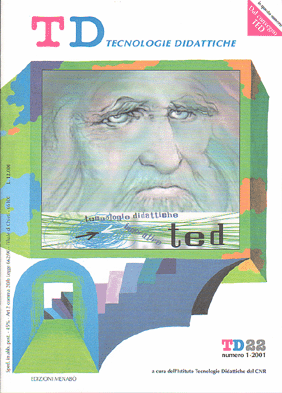Teaching of language, literature and history in the information society: some reflections
Main Article Content
Abstract
Article Details
Section
Authors who publish with this journal agree to the following terms:
- Authors retain copyright and grant the journal right of first publication with the work simultaneously licensed under a Creative Commons CC BY 4.0 Attribution 4.0 International License.
- Authors are able to enter into separate, additional contractual arrangements for the non-exclusive distribution of the journal's published version of the work (e.g., post it to an institutional repository or publish it in a book), with an acknowledgement of its initial publication in this journal.
- Authors are permitted and encouraged to post their work online (e.g., in institutional repositories or on their website) prior to and during the submission process, as it can lead to productive exchanges, as well as earlier and greater citation of published work (See The Effect of Open Access)
References
Bereiter C., Scardamalia M. (1992), Surpassing ourselves: an inquiry into the nature and implications of expertise, Open Court, Chicago.
Bereiter C., Scardamalia M. (1996), Rethinking learning, in (a cura di) Olson, D.R. e Torrance N., Handbook of Education and Human Development: New Models of Learning, Teaching and Schooling, MA, Basil Blackwell, Cambridge.
Bereiter C. (2001), Education and Mind in the Knowledge Age, Laurence Erlbaum Associates, New York, cap. 4.
Brockman J. (1995), The Third Culture. Beyond the scientific revolution, Simon & Schuster, New York; tr. it. (1995) La Terza Cultura. Oltre la rivoluzione scientifica, Garzanti, Milano.
Bruner J. (1997), The Culture of Education, Harvard U. Press, Cambridge (Mass.); tr. it. (1997) La cultura dell’educazione. Nuovi orizzonti per la scuola, Feltrinelli, Milano, cap. 7
Caviglia F., Smith K. A. (1999), Scienze cognitive, humanities, didattica: dialogo in margine a un seminario di Mark Turner, TD-Tecnologie Didattiche, vol. 17, n. 2.
Caviglia F. (2000a), Proposte didattiche attorno a un corpus di testi, TD-Tecnologie Didattiche, vol. 19, n. 1 (in rete a http://ww2.itd.ge.cnr.it/td/td19 /cavigliafr.htm).
Caviglia F. (2000b), Valori degli italiani: un percorso intorno alla famiglia, (Prè)pub n. 176-177, September 2000 (in rete a http://www.hum.au.dk/romansk/ romfrc/papers/indice_famiglia_ carta.htm).
Ceserani R. (1999), Guida allo studio della letteratura, Laterza, Bari.
Collins A., Brown J.S., Newman S. (1989), Cognitive Apprenticeship: Teaching the Craft of Reading, Writing, and Mathematics, in L.B. Resnick (Ed.)( 1989) Knowing, Learning and Instruction: Essays in Honor of Robert Glaser, Erlbaum, Hillsdale, NJ.
Cristofori A., Salvaterra C. (2001), Il futuro del passato: osservazioni sulle applicazioni di Internet alla didattica delle discipline antichistiche, TD-Tecnologie Didattiche, vol. 22, n. 1
Diamond J. (1991), The rise and fall of the third chimpanzee, Radius, London; tr. it. (1994) Il terzo scimpanzé. Ascesa e caduta del primate homo sapiens, Bollati Boringhieri, Torino.
Diamond J. (1997), Guns, germs and steel. A short history of everybody for the last 13.000 years, Chatto & Windo, London; tr. it. (1998), Armi, acciaio e malattie. Breve storia del mondo negli ultimi 13.000 anni, Einaudi, Torino.
Eco U. (1990), I limiti dell’interpretazione, Bompiani, Milano.
Ginzburg C. (1979), Spie. Radici di un paradigma indiziario, in AA. VV. (1979), La crisi della ragione, Einaudi, Torino, pp. 80-112; ristampato in it. (1992), Miti, emblemi, spie. Morfologia e storia, Einaudi, Torino.
Gallina V. (a cura di) (2000), La competenza alfabetica in Italia. Una ricerca sulla cultura della popolazione, Franco Angeli, Milano.
Jervis G. (1997), La conquista dell’identità, Feltrinelli, Milano.
Jervis G. (1999), Prime lezioni di psicologia, Laterza, Bari.
Lakoff G., Johnson M. (1980), Metaphors we live by, Un. of Chicago Press, Chicago.
Lakoff G., Turner M. (1989), More than cool reason: a field guide to poetic metaphor, Un. of Chicago Press, Chicago.
Maclay M. (1998), Guerre e tv: il caso Bosnia, Prospect, Gran Bretagna; tr. it in Internazionale, n. 215.
Mérõ L. (1998), Moral Calculations. Game theory, Logic and Human Frailty, Springer-Verlag, New York.
OCSE (a cura di) (2000), Literacy in the Information Age. Final Report on the International Adult Literacy Survey, Canada, (I dati sull’Italia provengono da [Gallina, 2000]).
Ong W. (1982), Orality and Literacy: The Technologizing of Word, Routledge, London; tr. it. (1986), Oralità e scrittura. Le tecnologie della parola, Il Mulino, Bologna.
Parisi D. (1999), Mente. I nuovi modelli della Vita Artificiale, Il Mulino, Bologna.
Parisi D. (2000), scuola@.it, Mondadori, Milano.
Rifkin J. (1996), La fine del lavoro. Il declino della forza lavoro globale e l’avvento dell’era postmarcato, Baldini e Castoldi, Milano.
Simone R. (2000), La Terza fase. Forme di sapere che stiamo perdendo, Laterza, Bari.
Tooby J., Cosmides L. (1992), The psychological foundation of culture, in Barlow, J. H., Cosmides, L. & Tooby J. (a cura di), The Adapted Mind : Evolutionary Psychology and the Generation of Culture, Oxford University Press, New York, pp. 19-136.
Turner M. (1991), Reading minds: the study of English in the age of cognitive science, Princeton University Press, Princeton-N.J.
Turner M. (1996), The literary mind, Oxford University Press, New York.
Weinrich H. (1966), Linguistik der Lüge, Lambert Schneider, Heidelberg; tr. it. Linguistica della menzogna in [Weinrich, 1976].
Weinrich H. (1976), Sprache in Texten, Klett-Kotta, Stuttgard; tr. it. ampliata (1982), Lingua e linguaggio nei testi, Feltrinelli, Milano.
Weinrich H. (1976), Metafora e menzogna, Il Mulino, Bologna.
Weinrich H. (1983), Vers la constitution d’une competence interrogative, Zielsprache Französisch, n. 2, pp. 57-64; tr. it. Per la costituzione di una competenza interrogativa, in Weinrich, H., (1989), Vie della cultura linguistica, Il Mulino, Bologna.
Wilson E. O. (1998), Consilience. The unity of knowledge, Little, Brown & C. London; tr. it. (1999), L’armonia meravigliosa, Mondadori, Milano.
Wilson M. e Daly M. (1992), The Man Who Mistook His Wife for a Chattel, in Barlow J. H., Cosmides, L. & Tooby J., (a cura di) The Adapted Mind : Evolutionary Psychology and the Generation of Culture, Oxford University Press, New York, pp. 289-322.

